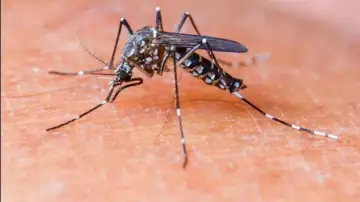
A sharp spike in dengue fever cases has been reported in many parts of the country after prolonged monsoon this year.
Delhi, UP, Haryana have especially witnessed sudden spurt of the disease. Dengue is a mosquito-borne disease caused by a virus spread by female Aedes mosquito. It cannot be passed from person-to-person directly. While most dengue cases are mild, some people may develop severe or life-threatening complications. People with diabetes are more susceptible to developing serious issues from dengue as the disease can raise blood sugar levels in diabetics. ( What is DENV-2, the deadly dengue variant that is spreading fast; know symptoms, causes, treatment)
“Individuals with diabetes are at risk of severe outcomes of several diseases and dengue is no exception. Moreover, dengue, being a stressful state to the body, can by itself raise the blood sugar levels in individuals with diabetes,” says Dr. Ranjit Unnikrishnan – Vice Chairman & Consultant, Dr. Mohan’s Diabetes Specialities Centre
Dr Unnikrishnan says people with uncontrolled blood sugar levels especially are at risk of developing rare complications of dengue such as dengue shock syndrome which could cause high-grade fever, damage to liver and intense bleeding.
 “The more serious consequences can involve Dengue Shock Syndrome, a rare complication in which there is a high fever, bleeding from the nose and gums, damage to lymph and blood vessels, enlargement of the liver, and collapse of the circulatory system. Eventually these signs can develop into intense bleeding, shock, and death. This infection is most common for those with weaker immunity (such as those with uncontrolled diabetes) or people with a second or successive dengue infection,” says the expert.
“The more serious consequences can involve Dengue Shock Syndrome, a rare complication in which there is a high fever, bleeding from the nose and gums, damage to lymph and blood vessels, enlargement of the liver, and collapse of the circulatory system. Eventually these signs can develop into intense bleeding, shock, and death. This infection is most common for those with weaker immunity (such as those with uncontrolled diabetes) or people with a second or successive dengue infection,” says the expert.
TIPS FOR PEOPLE WITH DIABETES TO AVOID SERIOUS DENGUE COMPLICATIONS
So, what should individuals with diabetes do to prevent these severe complications of dengue?
Dr Unnikrishnan says the most obvious solution would be to avoid contracting the infection in the first place, for which mosquito control and prevention of bites is of paramount importance.
“As the Aedes mosquito breeds in stagnant water around houses (such as flowerpots), it is important to keep these drained and dry throughout this season. Use of mosquito repellents and mosquito nets is also most useful,” he says.
– Any fever in a patient with diabetes should be evaluated thoroughly, particularly if sugars are not under control.
– Close monitoring of the patient’s clinical condition and lab parameters can help detect danger signs early, so that appropriate treatment can be started before it is too late.
– Last but not the least, it is imperative that all people with diabetes keep their sugar levels under good control so that risk of severe complications of infections such as dengue can be minimised.




 Driving Naari Programme launched in Chandigarh
Driving Naari Programme launched in Chandigarh






























